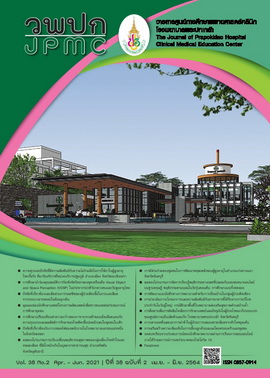Prevalence and Associated Factors of Medication Non-adherence among Elderly Patients with Chronic Diseases in Primary Care Setting of Chachoengsao Province
Main Article Content
Abstract
BACKGROUND: Elderly patients are prone to having multiple co-morbidities, so they are greater risk of polypharmacy. Non-adherence to medication among elderly patients with chronic diseases is an important problem that has been associated with poor clinical outcomes.
OBJECTIVES: The aim of this study was to determine the prevalence and associated factors of medication non-adherence among elderly patients with chronic diseases.
METHODS: A cross-sectional study was conducted in a primary care setting in Chachoengsao province, Thailand, between March and September, 2018. A total of 360 patients aged 60 years old and older who visited a primary care unit were recruited for the study by purposive sampling. The instruments used included the following: Demographic questionnaire, PHQ-9, and MMSE. Medication adherence was assessed using face-to-face interviews and pill counting. Data analysis was conducted by percent, prevalence rate and associated factors analyzed by using multiple logistic regression.
RESULTS: From 360 participants, their mean age was 70.2 + 6.9 years, while the number of medications was 4.0+1.6 and number of co-morbidities was 2.8 + 0.8. The reasons for medication non-adherence included use of non-prescribed drugs (27.2%), followed by unavailability (14.4%), lack of symptoms (7.2%), multiple medications (5.8%) and complex regimen (4.2%). Nearly half of the patients (47.8%) had medication non-adherence. Only cognitive impairment (p = 0.01) (odd ratio 1.94, 95%CI 1.16 - 3.25) and number of drugs (p = 0.002) (odd ratio 0.46, 95%CI 0.25, 0.86) had a positive significant relationship with medication non-adherence.
CONCLUSIONS: Medication adherence in elderly patients with chronic diseases was poor, similar to previous studies. Associated factors of non-adherence to medication with statistical significance were number of drugs and dementia. Physicians should carefully prescribe appropriate medications for elderly to improve their adherence to therapy. Screening for depression and dementia should be performed for every elderly patient as well.
Article Details
References
World population ageing. Department of economic and social affairs population division. [Internet]. New York: United Nations; 2017[cited 24 Feb 2018]; Available from : https://www.un.org/en/development/desa/population/publications/pdf/ageing/WPA2017_Report.pdf
Foundation of Thai gerontology research and development institute. Situation of the Thai elderly 2016. Printerly CO, Ltd; 2017.
Muangpaisan W, Pisalsalakij D, Intalapaporn S, Chattanawaree W. Medical nonadherence in elderly patients in a Thai geriatric clinic. Asian Biomedicine 2014;8(4):541-5.
Vatcharavongvan P, Puttawanchai V. Polypharmacy, medication adherence and medication management at home in elderly patients with multiple non-communicable diseases in Thai primary care. Family Medicine & Primary care review 2017;19:412-6.
Zelko E, Klemenc-Ketis Z, Tusek-Bunc K. Medication adherence in elderly with polypharmacy living at home : a systematic review of existing studies. Master Sociomed 2016;28:129-32.
Leetaweesuk J, Makee P, Charachan P, Yana P, Jindawattanawong P, Thiratanyaboon L, et al. Drug use behaviors of elderly patients with chronic disease in Chiang-Tong community Rahang Sub-District, Muang-Tak District, Tak Province. [Internet].2017 [cited 24 Feb 2018]; Available from: http://www.tsm.go.th/res/wp-content/uploads/2019/01/พฤติกรรมการใช้ยาของผู้ป่วยสูงอายุโรคเรื้อรัง-2017.pdf
Yap AF, Thirumoorthy T, Kwan YH. Medication adherence in the elderly. Journal of Clinical Gerontology & Geriatrics 2016;7:64-7.
Boonkert P. Mission : leader of dementia prevention and care in Asia [Internet]. 2018 [cited 2019 Sep 24]; Available from: https://thaidementia.com/news/assets/files/DAT_news_letter_10.pdf.
Lotrakul M, Sumrithe S, Saipanish R. Reliability and validity of the Thai version of the PHQ-9. BMC Psychiatry 2008;8:46.
Fernandez-Lazaro CI, García-González JM, Adams DP, Fernandez-Lazaro D, Mielgo-Ayuso J, Caballero-Garcia A, et al. Adherence to treatment and related factors among patients with chronic conditions in primary care: a cross-sectional study. BMC Fam Pract [Internet]. 2019 [cited 2020 Apr 3]; 20(1):132. Available from: https://bmcfampract.biomedcentral.com/articles/10.1186/s12875-019-1019-3
Napolitano F, Napolitano P, Angelillo IF. Medication adherence among patients with chronic conditions in Italy. Eur J Public Health 2016;26:48-52.
Roy NT, Sajith M, Bansode MP. Assessment of factors associated with low adherence to pharmacotherapy in elderly patients. J Young Pharm 2017;9:272-6.
Pattanajak C. Medication adherence in elderly patients with chronic disease at Lad Pattana Health Promoting Hospital, Muang District, Mahasarakham Province. Mahasarakham Hospital Journal 2019;16 (3):13-22.
Bunyatnopparat K, Limpawattana P. Factor associated with medication adherence in older patients with chronic disease of Dongluang Hospital. KKU Journal of Medicine 2019;5(2):40-9.
Smaje A, Weston-Clark M, Raj R, Orlu M, Davis D, Rawle M. Factors associated with medication adherence in older patients: a systematic review. Aging Med (Milton) 2018;1:254-66.

